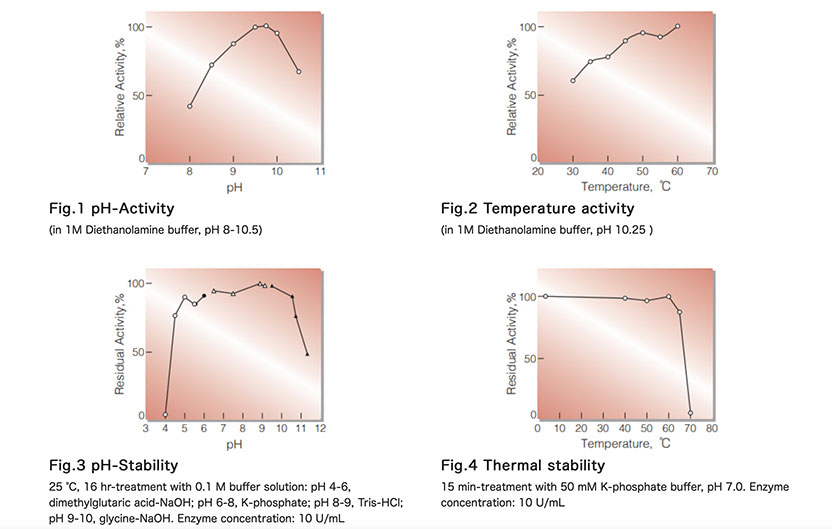ALKALINE PHOSPHATASE from Microorganism
LPP-229
Orthophosphoric-monoester phosphohydrolase (alkaline optimum) (EC 3.1.3.1)
Orthophosphoric monoester+H₂O→Alcohol+Orthophosphate
| Appearance: | Transparent liquid | |
|---|---|---|
| Activity: | Grade II 30,000 U/ml or more | |
| Contaminants: | Adenosine deaminase | ≤1.0×10⁻⁴ % |
| Phosphodiesterase | ≤3.0×10⁻³ % | |
| Stability: | Store at 4ºC |
|---|---|
| Molecular weight: | approx. 104,000 |
| Optimum pH : | 9.5(Fig.1) |
| Optimum temperature: | ≧ 60 ℃(Fig.2) |
| pH Stability: | pH 5.5-10.4 (25°C, 16hr)(Fig.3) |
| Thermal stability: | below 65℃ (pH 7.0, 60min) (Fig.4) |
APPLICATIONS
This enzyme is useful for molecular biology.
ASSAY
Principle:
alkaline phosphatase
p-Nitrophenylphosphate(pNPP) +H₂O ►p-Nitrophenol + Pi
The appearance of p-Nitrophenol is measured at 405nm by spectrophotometry.
Unit definition:
One unit causes the formation of one micromole of p-Nitrophenol per minute under the conditions described below.
Method:
| A.Diethanolamine buffer: | 1 M: Dilute 9.66 mL of diethanolamine (MW = 105.14) in 60 mL of H2O, add 5 mL of 0.1 M MgCl2, and, after adjusting the pH to 9.8 with 2 N HCl, make up to 100 mL with H2O (should be freshly prepared). |
|---|---|
| B. pNPP solution: | 0.674 M: 2.5g of p-nitrophenylphosphate disodium salt (MW = 371.16) in 10 mL of diethanolamine buffer (A). Should be freshly prepared. |
| C. Enzyme diluent: | 30 mM Triethanolamine, 1 mM MgCl2, 0.1 mM ZnCl2, 0.5 % sodium cholate, pH 7.6 |
Procedure
| Concentration in assay mixture | |
|---|---|
| Diethanolamine buffer | 0.97 M |
| p-Nitrophenylphoshate | 11 mM |
| MgCl₂ | 4.8 mM |
1. Prepare the following reaction mixture in a cuvette (d=1.0cm)
and equilibrate at 37℃ for about 5 minutes.
30 mL Diethanolamine buffer (A)
0.5 mL pNPP solution (B)
2. Pipette 3.0 mL of working solution into a cuvette (d = 1.0 cm) and equilibrate at 37 ℃ for approximately 5 minutes.
3. Add 0.1 mL of the enzyme solution* and mix by gentle inversion.
4. Record the increase in optical density at 405 nm against water for 3 to 5 minutes with a spectrophotometer thermostated at 37 ℃, and calculate the ∆OD per minute from the initial linear portion of the curve (∆OD test).
At the same time, measure the blank rate (∆OD blank) using the same method as the test except that the enzyme diluent (C) is added instead of the enzyme solution.
* Dilute the enzyme preparation to 0.1-0.3U/ml with ice-cold enzyme diluent (C), immediately before assay.
Calculation
Activity can be calculated by using the following formula :
ΔOD/min (ΔOD test−ΔOD blank) × Vt × df
Volume activity (U/ml) = = ΔOD/min × 1.676 × df
18.5 × 1.0 × Vs
- Weight activity (U/mg) = (U/ml)×1/C
- Vt
- : Total volume (3.1ml)
- Vs
- : Sample volume (0.1ml)
- 18.5
- : Millimolar extinction coefficient of p-Nitrophenol under the assay condition (cm²/micromole)
- 1.0
- : Light path length (cm)
- df
- : Dilution factor

To get a quote, contact us at info@toyobousa.com, or INQUIRY.